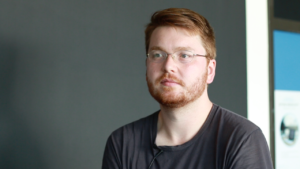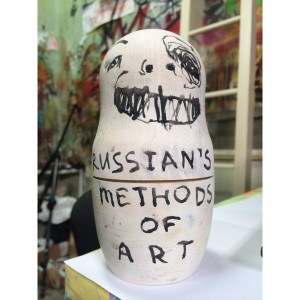In terms of funding one could call me a theater artist. Mostly I work with theaters or I earn support money from this system. Hence, my work is usually classified as theater. From my point of view, my work is sometimes political action and very often it’s a film and a book is published in the end. I try to develop a concept for every project but all the concepts do run in a similar direction. It is always about important political events or society in a political sense.
The Moscow Trials is about the trial of Pussy Riot and other artists. It deals with art, the liberty of art and religion. I created a real process that took more than three days. We enacted a real trial following the penal code with proper lawyers, defenders, experts, a jury and a correct verdict.
Therefore, one might say: I am a conceptual artist but not in the desolate, empty intellectual way as it’s usually used. So, I am a conceptual artist because it is important to me to develop a concept that creates a tension around the topic that bears more than just the official description or story of it. Although, I do often refer to current events, I am neither interested in narrating stories nor am I interested in illustrating them. I do not care about telling a story, or representing events because I often refer to things that actually took place. But I am interested in creating a space for re-negotiating those actions. Moscow trials, for example, led to the verdict of not guilty for the artists instead of a sentence like in the original trial. I would say I try to create a reality, which is more real than the reality, in a sense – a reality, which is partially socially possible in the containment. For example in Moscow it is not possible that the artists are pledged not-guilty but it is possible that I create a space that works on judicial rules, where lawyers judge according to the normal rules and win acquittal that would be valid in real-life law. One of the involved lawyers, who had lost the process in reality, when I asked her why she joined my project, answered that she doesn’t want to act anymore. She wants to negotiate this process once again under real conditions. Where she has a real chance. These are actually the spaces that I try to open for the people who join me. The format changes from project to project. I work with state theaters: at the theater in Berlin recently, for example, and currently at the Residence Theater in Munich. In these cases it is always a problem to work with actors or artists that are in the ensemble and are paid to work with me. Tomorrow they work with Pollesch, yesterday they worked with somebody and tomorrow they will with someone else. One day they enact Chekov and another they make a project with me and then again on something else. Under these conditions I have a problem and I take an extremely long time to find people in these ensembles that feel they need to work with me. To find people who are interested in the subject instead of joining me because they simply have a contract. There are only a few people that publish three great pieces every year from a young age to eighty-five. They might be the rare artistic genius. One has to accept that! As an artist you have to learn to let time pass. Meaning, you constantly produce, but it is not always productive. You have to accept that quite a lot leads to nothing. You need to have the courage to accept the “freezing effect”, expressed in business terms. You follow a path and make it better and better but in the end you have to admit that the outcome is not good enough and despite all the work you need to start all over again. It is very hard and difficult to admit that in a field with high expenses and a lot of people involved.
It’s my job to make sure people are ready and able to work and it’s my responsibility to create a situation for everyone that enables them to work well and know what they do makes sense.
Förderungstechnisch muss man vielleicht sagen, dass ich Theaterkünstler bin. Ich arbeite meistens mit Theaterhäusern oder Fördermitteln zusammen. Deshalb werden meine Arbeiten meistens unter Theater abgehakt. In meinen Augen sind es manchmal politische Aktionen, sehr oft sind es Filme, die rauskommen, oft erscheinen Bücher. Ich versuche eigentlich pro Projekt ein neues Konzept zu entwickeln, das immer in eine ähnliche Richtung geht. Es geht immer um gesellschaftlich politisch wichtige Ereignisse. Bei den Moskauer Prozessen war das der Prozess gegen Pussy Riot und gegen andere Künstler. Da ging es um Kunst, Freiheit, Religion. Und das Konzept war eigentlich, dass ich einen richtigen Prozess gemacht habe, der über drei Tage ging. Mit richtigen Anwälten, richtigen Verteidigern, richtigen Experten, einer richtigen Jury und eine Verhandlung nach Strafgesetzbuch und ein richtiges Urteil. Deshalb könnte man vielleicht sagen: Ich bin ich Konzeptkünstler. Aber nicht in dem öden, leeren intellektualistischen Sinne wie das Wort normalerweise verwendet wird. Also bin ich Konzeptkünstler, indem es für mich wichtig ist immer ein Konzept zu entwickeln, welches das Verhandelte in eine Spannung bringt, die es über die Darstellung von irgendetwas oder die Erzählung von irgendetwas hinaus bringt. Mich interessiert es nicht Geschichte zu erzählen, mich interessiert es auch nicht Ereignisse darzustellen, da ich oft auf Dinge Bezug nehme, die statt gefunden haben, sondern Raum zu schaffen wo sie neuverhandelbar werden. Oder wo etwas Neues mit ihnen passiert. Zum Beispiel Moskauer Prozesse führten zum Freispruch der Künstler, die in den ursprünglichen Prozessen alle verurteilt wurden. Ich würde sagen, ich versuche eine Realität zu schaffen, die gewissermaßen realer ist, als die Realität, die teilweise gesellschaftlich möglich ist in der Eingrenzung. Es ist beispielsweise in Moskau nicht möglich, dass die Künstler freigesprochen werden. Aber es ist möglich, dass ich einen Raum schaffe, der nach Justizregeln funktioniert, wo Juristen da sind und wo nach normalen Regeln geurteilt wird, die gültig im Gesetz und es zu einem Freispruch kommt. Eine der Beteiligten, eine Juristin, die die Prozesse verloren hatte in der Wirklichkeit, sagte, als ich sie fragte warum sie bei mir mitmachen würde, dass sie keine Lust mehr hätte Theater zu spielen. Sie will diesen Prozess mal unter Bedingungen verhandeln wo sie eine Chance hat. Wo sie eine reale Chance hat. Und das sind eigentlich die Räume, die ich versuche zu öffnen für die Leute, die bei mir mitmachen auch für die Künstler. Das Format ändert sich eigentlich von Projekt zu Projekt. Ich inszeniere auch an staatlichen Theatern. An der Schaubühne in Berlin und im Residenztheater demnächst in München. Und es ist für mich immer ein Problem mit Schauspielern oder Künstlern zu arbeiten, die im Ensemble sind und bezahlt werden, dass sie mit mir arbeiten und morgen arbeiten sie mit Pollesch und gestern haben sie mit xy gearbeitet und übermorgen mit noch Jemandem. Und gestern machen sie Tschechow und heute machen sie mit mir ein Projekt und morgen machen sie nochmal was Anderes. Da habe ich ein Problem und ich nehme mir auch extrem viel Zeit in diesen Ensembles Leute zu finden, die eine Notwendigkeit spüren mit mir zu arbeiten. Und die das Thema, das ich mit ihnen machen will, machen wollen und das nicht machen, weil sie da zufällig einen Vertrag haben. Also dass es jemanden gib, der von seinem fünfzehnten bis fünfundachtzigsten Lebensjahr jedes Jahr drei großartige Werke macht… da gibt es ganz wenige. Also wenn man von Genies sprechen will. Und das muss man glaube ich hinnehmen. Und man muss, denk ich, als Künstler lernen, dass man die Zeit dann verstreichen lässt. Also man muss immer produzieren, aber man muss nicht immer produktiv sein. Das ganz viel nichts wird oder, dass man den Mut hat. Also man nennt das in der Managementsprache ja den Gefriereffekt. Dass man ein Jahr lang einem Weg folgt und ihn professionell immer besser macht aber am Schluss sich zugesteht, dass das Produkt… dass man es nicht fertig macht, sondern dass man sagt: Das wird einfach nichts und dann noch mal umschwenkt. Das ist extrem schwierig und anstrengend sich das einzugestehen, wenn man in einem doch relativ Ausgaben teurem Bereich arbeitet, wo sehr viele Leute beschäftigt sind. Ich bin eigentlich der, der dafür sorgen muss, dass die Anderen arbeiten können. Dass sie gut arbeiten können oder dass sie wissen, was sie tun oder das Gefühl haben es zu wissen und dass, das was sie tun, irgendwie Sinn macht, sag ich mal.

















